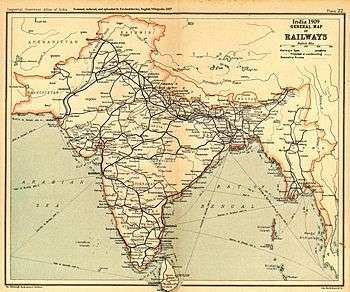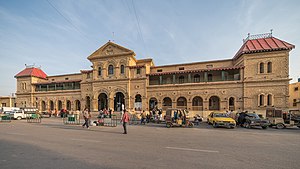Thar Express
Thar Express (Urdu: تھر ایکسپریس, Sindhi: ٿر ايڪسپريس) is an international passenger train operated weekly by Pakistan Railways between Karachi and Khokhrapar,[3] linking with the Thar Link Express (Hindi: थार लिंक एक्सप्रेस) operated weekly by Indian Railway using its own coaches and locomotives, between Munabao and Jodhpur.[4] Passengers from Munabao clear customs and are transported to across the border to Zero Point station where the Thar Express takes passengers to Karachi, Pakistan.
| Overview | |
|---|---|
| Service type | Inter-city rail |
| First service | 2006[1] |
| Current operator(s) | Pakistan Railways |
| Route | |
| Start | Karachi Cantonment |
| Stops | 3 |
| End | Zero Point |
| Distance travelled | 381 kilometres (237 mi) |
| Average journey time | 7 hours, 5 minutes |
| Service frequency | Weekly |
| Train number(s) | 405UP (Karachi→Zero Point) 406DN (Zero Point→Karachi)[2] |
| On-board services | |
| Class(es) | Economy |
| Sleeping arrangements | Not available |
| Catering facilities | Not available |
| Technical | |
| Track gauge | 1,676 mm (5 ft 6 in) |
The Pakistan leg takes approximately 7 hours, 5 minutes to cover a published distance of 381 kilometres (237 mi), traveling along a stretch of the Karachi–Peshawar Railway Line and Hyderabad–Khokhrapar Branch Line.[5] Upon reaching Zero Point railway station and clearing customs, passengers cross the border to Munabao, India and board the Thar Link Express to Jodhpur.
As of August 9, 2019, the Thar Express has been cancelled until further notice due to escalating tensions between India and Pakistan.[6]
History
In India

The track between Barmer, forming part of the then Jodhpur princely State, and Shadi Palli in Sindh, on which the current Thar Link Express runs, was opened in December 1900 to run the Sind Mail, which ran between Bombay and Karachi through Munabao, via Ahmedabad - Palanpur - Marwar - Pali - Jodhpur - Lun - Barmer - Munabao - Khokhrapar - Mirpur Khas - Hyderabad. During Indo-Pakistani War of 1965, the rail track was bombed and destroyed by the Pakistani fighter jets, and the Mumbai-Karachi train ended.[4][7][8][8]

On 28 June 1976, India and Pakistan signed the rail communication agreement, to normalise the relations between two nations after signing the Simla Agreement (2 July 1972) few months after the end of Indo-Pakistani War of 1971, when the bilateral relations had soured after the Indian Army had succeeded in liberating Bangladesh. The renewable rail communication agreement was again extended by both nations from 19 January 2016 to 18 January 2019. This agreement forms the basis of running Thar Link Express, as well as the Samjhauta Express. The Delhi–Lahore Bus and Srinagar-Muzaffarabad Bus are based on a separated agreement.
The Thar Link Express is a continuation of the previous Sind Mail, when it was revived after a period of 41 years on 18 February 2006. Indian network, on which this train runs, was converted to broad gauge long ago. In 2005, Pakistan also converted the line from metre gauge to broad gauge. This enabled both the nations to sign a MoU to reopen the rail link. This was not possible earlier because there would be a change of gauge in between, either at Hyderabad or Mirpur Khas. Prior to 1965, the last Pakistani station was Khokhropar railway station, about 10 kilometers from the border. When the new service began in 2006, Pakistan constructed a new station, called Zero Point railway station, a few hundred meter from the border, where immigration and customs checks are carried out now. Opposite this, six kilometers apart, Munabao railway station is located on the Indian side of the border in Barmer district of Rajasthan, where Indian immigration and customs checks are carried out.[4][7][8]
In Pakistan
The Thar Express is a continuation of the previous Sind Mail which was revived after a period of 41 years on 18 February 2006. The Thar Express travels along the Hyderabad–Khokhrapar Branch Line which was built in 1892 as the Hyderabad–Jodhpur Railway and was originally constructed as a 1,676 mm (5 ft 6 in) broad gauge railway line. In 1901, the section was converted to 1,000 mm (3 ft 3 3⁄8 in) metre gauge where it joined the second section between Shadipalli and Luni and on wards to Jodhpur.[9][10] In February 2006, the entire Hyderabad–Khokhrapar line was re-converted again back to the original 1676 mm broad gauge line. Prior to 1965, the last station was Khokhropar railway station, about 10 kilometers from the border. When the new service began in 2006, Pakistan Railways constructed a new station, called Zero Point railway station, a few hundred meter from the border, where immigration and customs checks are carried out now. Opposite this, six kilometers apart, Munabao railway station is located on the Indian side of the border in Barmer district of Rajasthan, where Indian immigration and customs checks are carried out.
Route
India
The non-stop weekly train is operated by the Jodhpur railway division of the North Western Railway zone of Indian Railways. The train is formed with the Indian rolling stock and locomotive for end to end journey in both directions, from Jodhpur to Karachi. The train is formed with one diesel locomotive and 9 standard Indian ICF Coaches in the following combination, L-SLR-S7-S6-S5-S4-S3-S2-S1-SLR (L - locomotive, SLR Seating cum luggage rake, S - Seating rake).[11]
The train begins its journey with the Indian rolling stock and locomotive from the Bhagat Ki Kothi railway station in Jodhpur, traveling westwards from Balotra - Barmer - Manabao, where it crosses the border to Pakistan, traveling along a stretch of the Hyderabad–Khokhrapar Branch Line and Karachi–Peshawar Railway Line. The trip takes approximately 12 hours and 15 minutes to cover a published distance of 381 kilometres (237 mi), departing from Bhagat Ki Kothi every Saturday 01:00 IST and arriving at Munabao at 07:00 IST. After customs, it crosses the border into Pakistan and arrives at Zero Point at 14:30 PST and reaches Karachi Cantonment at 2:15 PST on Sunday.[12]
Pakistan

The trip takes approximately 7 hours and 5 minutes to cover a published distance of 381 kilometers (237 mi), traveling along a stretch of the Karachi–Peshawar Railway Line and Hyderabad–Khokhrapar Branch Line. The train departs Karachi Cantonment railway station every Friday at 23:45 PST and arrives at Zero Point railway station near Khokhrapar at 07:00 PST on Saturday. Zero Point serves as the final station on the Pakistani side, whereby passengers clear customs and cross the border into India to arrive at the border town of Munabao. Passengers then have to buy tickets for the Thar Link Express which departs to Bhagat Ki Kothi in Jodhpur. On the return leg, the train departs Zero Point railway station on Saturday at 17:00 PST and arrives at Karachi Cantonment railway station at 01:00 PST on Sunday.
Stations in Pakistan
- Karachi Cantonment
- Hyderabad Junction
- Mirpur Khas
- Khokhropar
- Zero Point > to Thar Link Express
See also
- Sind Mail
- Samjhauta Express, the only other surviving train between India and Pakistan
References
- "Travelling on the Thar Express". Dawn. 20 February 2006. Retrieved 17 November 2018.
- Bhagwandas (16 January 2015). "Over 200 ticketless passengers travelled to India on Thar Express".
- Mughal, Owais (29 October 2004). "Pakistan Railway Train Names". irfca.org. Indian Railways Fan Club. Retrieved 19 June 2017.
- "Greater Kashmir news".
- Ask, created by. "Thar Express Train Timing Karachi Mirpur Zero Point". www.railpk.com.
- "14889/Thar Link Express - IRCTC Fare Enquiry". Retrieved 30 November 2019.
- How to get to Pakistan, The Hindu, 12 May 2017
- "[IRFCA] Indian Railways FAQ: Geography : International". www.irfca.org.
- " Administration Report on the Railways in India – corrected up to 31st March 1918"; Superintendent of Government Printing, Calcutta; page 188; Retrieved 6 Feb 2016
- "IR History: Part III (1900-1947)". IRFCA. Retrieved 30 April 2014.
- Thar Link Express, Indian Rail Info.
- "Train travel in Pakistan - a beginner's guide". Seat61.com. 17 February 2006. Retrieved 19 March 2012.
- "Archived copy". Archived from the original on 5 November 2013. Retrieved 21 April 2013.CS1 maint: archived copy as title (link)